一般将来时
一般将来时
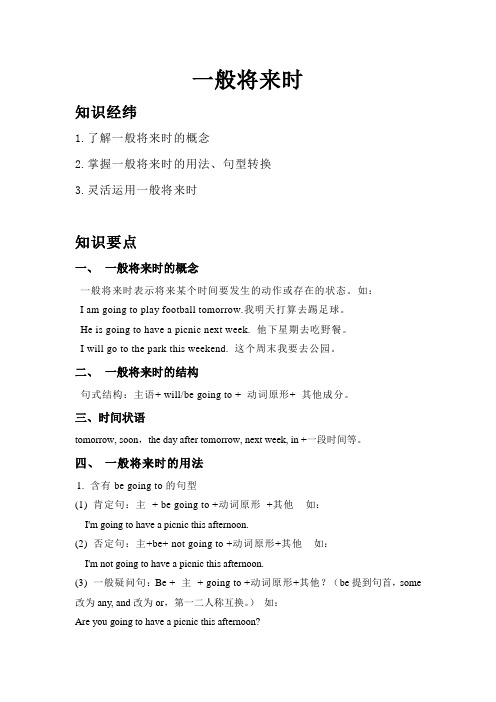
一般将来时知识经纬1.了解一般将来时的概念2.掌握一般将来时的用法、句型转换3.灵活运用一般将来时知识要点一、一般将来时的概念一般将来时表示将来某个时间要发生的动作或存在的状态。
如:I am going to play football tomorrow.我明天打算去踢足球。
He is going to have a picnic next week. 他下星期去吃野餐。
I will go to the park this weekend. 这个周末我要去公园。
二、一般将来时的结构句式结构:主语+ will/be going to + 动词原形+ 其他成分。
三、时间状语tomorrow, soon,the day after tomorrow, next week, in +一段时间等。
四、一般将来时的用法1. 含有be going to的句型(1) 肯定句:主+ be going to +动词原形+其他如:I'm going to have a picnic this afternoon.(2) 否定句:主+be+ not going to +动词原形+其他如:I'm not going to have a picnic this afternoon.(3) 一般疑问句:Be + 主+ going to +动词原形+其他?(be提到句首,some 改为any, and改为or,第一二人称互换。
)如:Are you going to have a picnic this afternoon?肯定回答:Yes, I am.否定回答:No, I’m not.2. 含有will的句型(will可用于所有人称,shall只用于第一人称I和we)( 1 ) 肯定句:主+ will +动词原形+其他如:I will play football tomorrow.(2) 否定句:主+ won’t +动词原形+其他(will后加not成won't)如:I won’t play football tomorrow.(3) 一般疑问句:Will + 主+ +动词原形+其他?(will提到句首,some改为any, and改为or,第一二人称互换) 如:Will you play football tomorrow?肯定回答:Yes, I will.否定回答:No, I won’t.五、一般将来时的特殊疑问句一般情况下,一般将来时的对划线部分有三种情况。
时态一般将来时
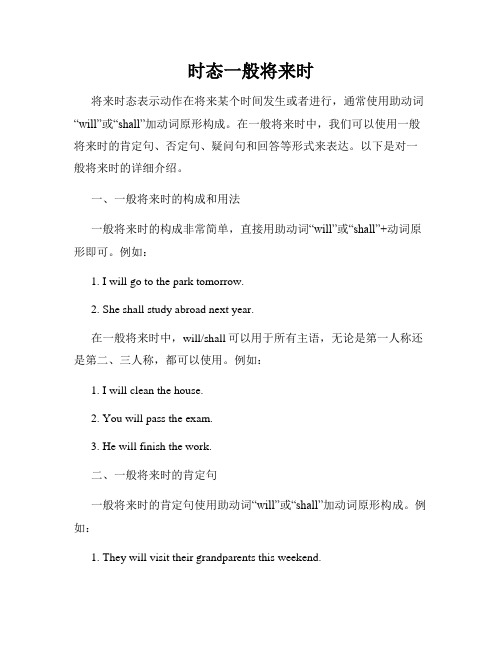
时态一般将来时将来时态表示动作在将来某个时间发生或者进行,通常使用助动词“will”或“shall”加动词原形构成。
在一般将来时中,我们可以使用一般将来时的肯定句、否定句、疑问句和回答等形式来表达。
以下是对一般将来时的详细介绍。
一、一般将来时的构成和用法一般将来时的构成非常简单,直接用助动词“will”或“shall”+动词原形即可。
例如:1. I will go to the park tomorrow.2. She shall study abroad next year.在一般将来时中,will/shall可以用于所有主语,无论是第一人称还是第二、三人称,都可以使用。
例如:1. I will clean the house.2. You will pass the exam.3. He will finish the work.二、一般将来时的肯定句一般将来时的肯定句使用助动词“will”或“shall”加动词原形构成。
例如:1. They will visit their grandparents this weekend.2. We shall have a party to celebrate.三、一般将来时的否定句一般将来时的否定句在助动词“will”或“shall”后面加上“not”,形成“will not”或“shall not”。
例如:1. She will not go to the concert.2. We shall not be late for the meeting.四、一般将来时的疑问句一般将来时的疑问句是将助动词“will”或“shall”提到主语之前。
例如:1. Will you join us for dinner?2. Shall we go to the cinema together?五、一般将来时的答案在一般将来时的疑问句中,肯定回答用"Yes, 主语 + will/shall"的形式,否定回答用"No, 主语 + will/shall not"的形式。
一般将来时

由于will后接动词原形, 因此在 “there be”句型一般将来时的句中 will之后用be动词的原形, 即“be”一词, 无论后面是单、复数或不可数名 词(短语)。 e.g. There won’t be any paper money.
There will only be one country.
( ) 14. If it ________ tomorrow, we’ll go rollerskating.真实条件句用于陈述语气,表示存在的情况可能发生。其 中t if 是如果的意思。 A. isn’ rain B. won’t rain 在 if引导的是条件从句,用一般现在时, 主句用将来时。 C. doesn ’t rain D. doesn’t fine 主句中一般用shall/will 表示将来,而不用be going to 表
练习题
( ) 1. There __________ a meeting tomorrow afternoon.
A. will be going to C. is going to be
B. will going to be D. will go to be
( ) 2. Charlie ________ here next month. A. isn’t working B. doesn’t working
( ) 6. Mother ________ me a nice present on my next birthday. A. will gives B. will give C. gives D.l I buy a cup of tea for you? –________. (不,不要。) A. No, you won’t. B. No, you aren’t. C. No, please don’t. D. No, please.
一般将来时
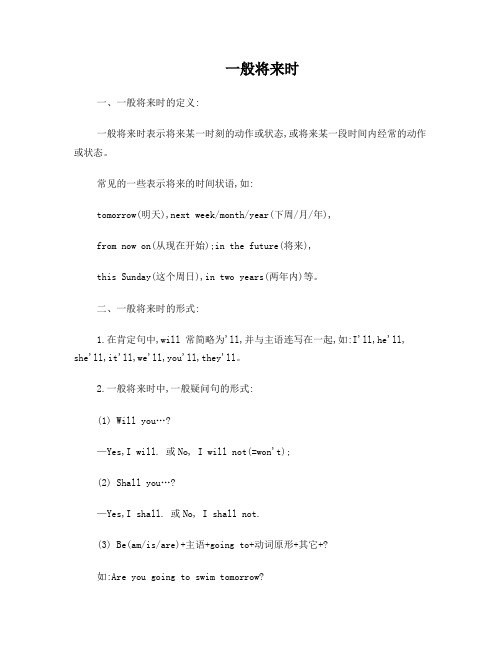
一般将来时一、一般将来时的定义:一般将来时表示将来某一时刻的动作或状态,或将来某一段时间内经常的动作或状态。
常见的一些表示将来的时间状语,如:tomorrow(明天),next week/month/year(下周/月/年),from now on(从现在开始);in the future(将来),this Sunday(这个周日),in two years(两年内)等。
二、一般将来时的形式:1.在肯定句中,will 常简略为'll,并与主语连写在一起,如:I'll,he'll, she'll,it'll,we'll,you'll,they'll。
2.一般将来时中,一般疑问句的形式:(1) Will you…?—Yes,I will. 或No, I will not(=won't);(2) Shall you…?—Yes,I shall. 或No, I shall not.(3) Be(am/is/are)+主语+going to+动词原形+其它+?如:Are you going to swim tomorrow?—Yes, I am./ No, I'm not.Is he/she going to play football next weekend?—Yes, he/she is./ No, he/she isn't.Are they going to go shopping this Sunday?—yes, they are./ No, they aren't.三、一般将来时的用法:1.一般将来时由“助动词shall(用于第一人称),或者will(用于第一、二、三人称)+动词原形”构成。
这种将来意义常常夹杂着情态意义即带有说话人的主观态度和看法,比如表示“预见”。
有时也含有“意愿”或“意图”的意思。
一般将来时
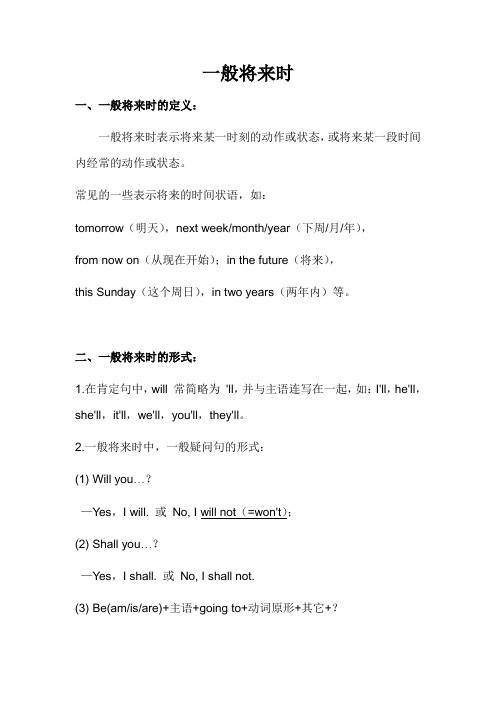
一般将来时一、一般将来时的定义:一般将来时表示将来某一时刻的动作或状态,或将来某一段时间内经常的动作或状态。
常见的一些表示将来的时间状语,如:tomorrow(明天),next week/month/year(下周/月/年),from now on(从现在开始);in the future(将来),this Sunday(这个周日),in two years(两年内)等。
二、一般将来时的形式:1.在肯定句中,will 常简略为'll,并与主语连写在一起,如:I'll,he'll,she'll,it'll,we'll,you'll,they'll。
2.一般将来时中,一般疑问句的形式:(1) Will you…?—Yes,I will. 或No, I will not(=won't);(2) Shall you…?—Yes,I shall. 或No, I shall not.(3) Be(am/is/are)+主语+going to+动词原形+其它+?如:Are you going to swim tomorrow?—Yes, I am./ No, I'm not.Is he/she going to play football next weekend?—Yes, he/she is./ No, he/she isn't.Are they going to go shopping this Sunday?—yes, they are./ No, they aren't.三、一般将来时的用法:1.一般将来时由“助动词shall(用于第一人称),或者will(用于第一、二、三人称)+动词原形”构成。
这种将来意义常常夹杂着情态意义即带有说话人的主观态度和看法,比如表示“预见”。
有时也含有“意愿”或“意图”的意思。
一般将来时
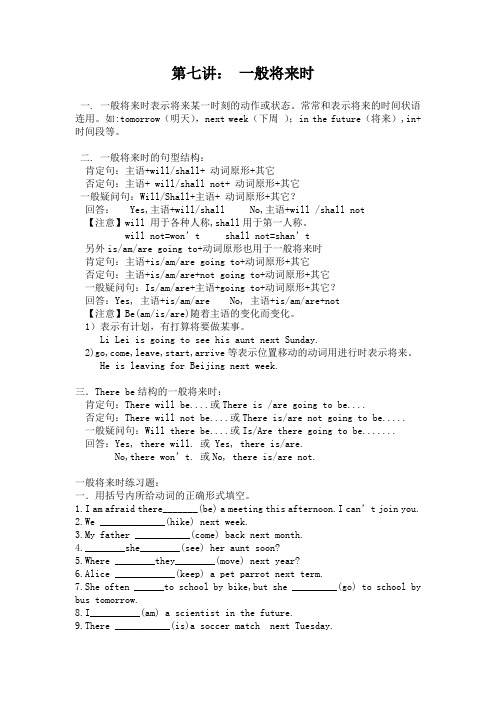
第七讲:一般将来时一. 一般将来时表示将来某一时刻的动作或状态。
常常和表示将来的时间状语连用。
如:tomorrow(明天),next week(下周);in the future(将来),in+时间段等。
二. 一般将来时的句型结构:肯定句:主语+will/shall+ 动词原形+其它否定句:主语+ will/shall not+ 动词原形+其它一般疑问句:Will/Shall+主语+ 动词原形+其它?回答: Yes,主语+will/shall No,主语+will /shall not【注意】will 用于各种人称,shall用于第一人称。
will not=won’t shall not=shan’t另外is/am/are going to+动词原形也用于一般将来时肯定句:主语+is/am/are going to+动词原形+其它否定句:主语+is/am/are+not going to+动词原形+其它一般疑问句:Is/am/are+主语+going to+动词原形+其它?回答:Yes, 主语+is/am/are No, 主语+is/am/are+not【注意】Be(am/is/are)随着主语的变化而变化。
1)表示有计划,有打算将要做某事。
Li Lei is going to see his aunt next Sunday.2)go,come,leave,start,arrive等表示位置移动的动词用进行时表示将来。
He is leaving for Beijing next week.三.There be结构的一般将来时:肯定句:There will be....或There is /are going to be....否定句:There will not be....或There is/are not going to be.....一般疑问句:Will there be....或Is/Are there going to be.......回答:Yes, there will. 或 Yes, there is/are.No,there won’t. 或No, there is/are not.一般将来时练习题:一.用括号内所给动词的正确形式填空。
一般将来时
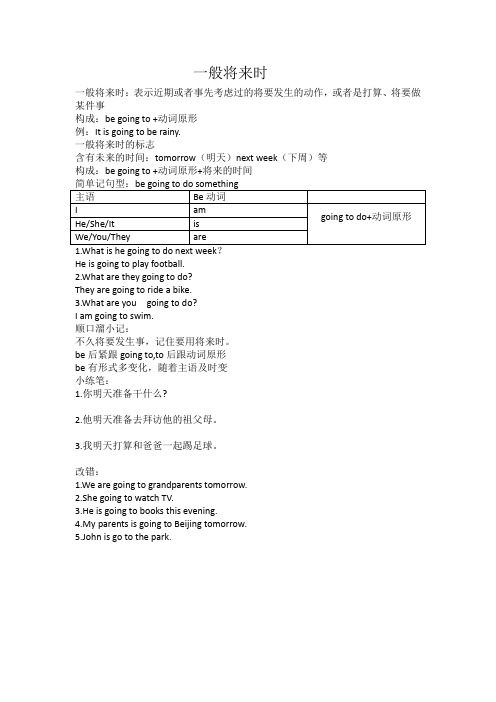
一般将来时
一般将来时:表示近期或者事先考虑过的将要发生的动作,或者是打算、将要做某件事
构成:be going to +动词原形
例:It is going to be rainy.
一般将来时的标志
含有未来的时间:tomorrow(明天)next week(下周)等
构成:be going to +动词原形+将来的时间
He is going to play football.
2.What are they going to do?
They are going to ride a bike.
3.What are you going to do?
I am going to swim.
顺口溜小记:
不久将要发生事,记住要用将来时。
be后紧跟going to,to后跟动词原形
be有形式多变化,随着主语及时变
小练笔:
1.你明天准备干什么?
2.他明天准备去拜访他的祖父母。
3.我明天打算和爸爸一起踢足球。
改错:
1.We are going to grandparents tomorrow.
2.She going to watch TV.
3.He is going to books this evening.
4.My parents is going to Beijing tomorrow.
5.John is go to the park.。
一般将来时的定义、结构、例句、用法
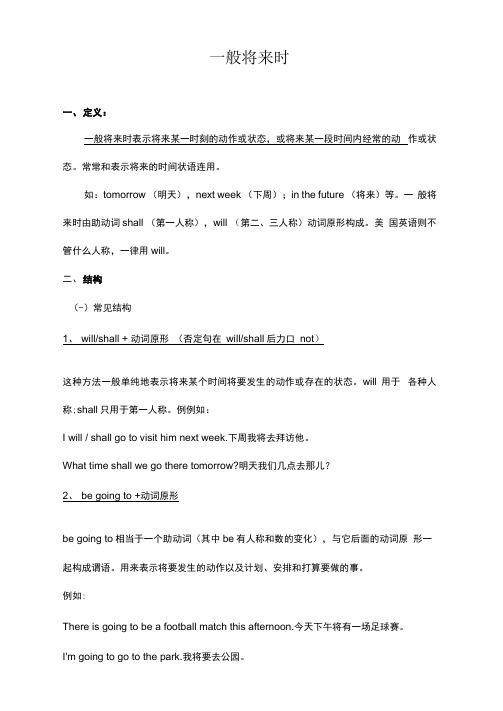
一般将来时一、定义:一般将来时表示将来某一时刻的动作或状态,或将来某一段时间内经常的动作或状态。
常常和表示将来的时间状语连用。
如:tomorrow (明天),next week (下周);in the future (将来)等。
一般将来时由助动词shall (第一人称),will (第二、三人称)动词原形构成。
美国英语则不管什么人称,一律用will。
二、结构(-)常见结构1、will/shall + 动词原形(否定句在will/shall后力口not)这种方法一般单纯地表示将来某个时间将要发生的动作或存在的状态。
will用于各种人称;shall只用于第一人称。
例例如:I will / shall go to visit him next week.下周我将去拜访他。
What time shall we go there tomorrow?明天我们几点去那儿?2、be going to +动词原形be going to相当于一个助动词(其中be有人称和数的变化),与它后面的动词原形一起构成谓语。
用来表示将要发生的动作以及计划、安排和打算要做的事。
例如:There is going to be a football match this afternoon.今天下午将有一场足球赛。
I'm going to go to the park.我将要去公园。
(-)常用结构1、用于"I expect, I'm sure, I think, I wonder 等的宾语从句"中。
Don't worry about the exam. I'm sure you'll pass.不要担心这次考试,我确信你会通过的。
2、用于祈使句和陈述句中。
Work hard and you will succeed.如果你努力,就会成功的。
3、与表示时间或条件的状语从句连用。
一般将来时总结
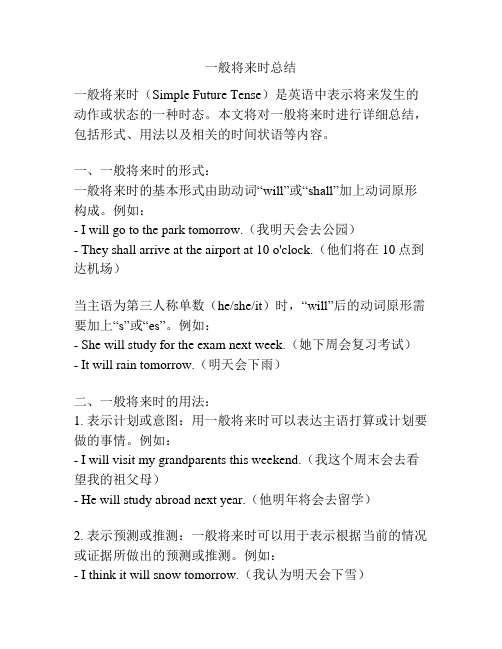
一般将来时总结一般将来时(Simple Future Tense)是英语中表示将来发生的动作或状态的一种时态。
本文将对一般将来时进行详细总结,包括形式、用法以及相关的时间状语等内容。
一、一般将来时的形式:一般将来时的基本形式由助动词“will”或“shall”加上动词原形构成。
例如:- I will go to the park tomorrow.(我明天会去公园)- They shall arrive at the airport at 10 o'clock.(他们将在10点到达机场)当主语为第三人称单数(he/she/it)时,“will”后的动词原形需要加上“s”或“es”。
例如:- She will study for the exam next week.(她下周会复习考试)- It will rain tomorrow.(明天会下雨)二、一般将来时的用法:1. 表示计划或意图:用一般将来时可以表达主语打算或计划要做的事情。
例如:- I will visit my grandparents this weekend.(我这个周末会去看望我的祖父母)- He will study abroad next year.(他明年将会去留学)2. 表示预测或推测:一般将来时可以用于表示根据当前的情况或证据所做出的预测或推测。
例如:- I think it will snow tomorrow.(我认为明天会下雪)- They believe she will win the competition.(他们相信她会赢得比赛)3. 表示意愿或允诺:一般将来时可以表达主语的意愿或承诺要做某事。
例如:- I will help you with your homework.(我会帮你做作业)- He will stop smoking.(他将戒烟)4. 表示预定的事件或安排的计划:一般将来时可以用于表示已经安排好的事件或计划。
一般将来时知识点
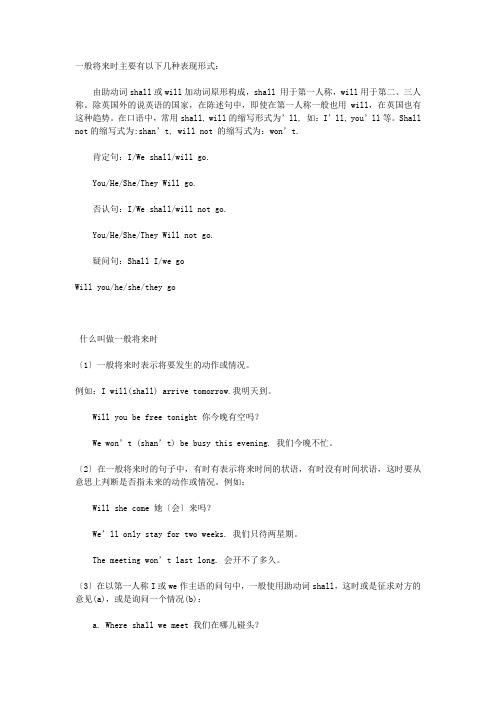
一般将来时主要有以下几种表现形式:由助动词shall或will加动词原形构成,shall 用于第一人称,will用于第二、三人称。
除英国外的说英语的国家,在陈述句中,即使在第一人称一般也用will,在英国也有这种趋势。
在口语中,常用shall, will的缩写形式为’ll, 如:I’ll, you’ll等。
Shall not的缩写式为:shan’t, will not 的缩写式为:won’t.肯定句:I/We shall/will go.You/He/She/They Will go.否认句:I/We shall/will not go.You/He/She/They Will not go.疑问句:Shall I/we goWill you/he/she/they go什么叫做一般将来时〔1〕一般将来时表示将要发生的动作或情况。
例如:I will(shall) arrive tomorrow.我明天到。
Will you be free tonight 你今晚有空吗?We won’t (shan’t) be busy this evening. 我们今晚不忙。
〔2〕在一般将来时的句子中,有时有表示将来时间的状语,有时没有时间状语,这时要从意思上判断是否指未来的动作或情况。
例如:Will she come 她〔会〕来吗?We’ll only stay for two weeks. 我们只待两星期。
The meeting won’t last long. 会开不了多久。
〔3〕在以第一人称I或we作主语的问句中,一般使用助动词shall,这时或是征求对方的意见(a),或是询问一个情况(b):a. Where shall we meet 我们在哪儿碰头?b. Shall we have any classes tomorrow明天我们有课吗?在这类问句中,近年来也有不少人用will,特别是在美国。
例如:How will I get there 我怎么去?〔4〕be going to+动词原形a.表示打算、准备做的事。
一般将来时讲解(附习题+答案)

一般将来时讲解(附习题+答案)一、一般将来时的含义:表示动作发生在将来二、一般将来时的句型:(1) will/shall+动词原形(2) be going to+动词原形三、一般将来时的时间状语:tomorrow(明天)、the day after tomorrow(后天)、next...(下一...): next week(下一周)、next year(明年)、next month(下个月)in+一段时间(...之后): in three days(三天之后)、in the future在未来this evening(今天晚上)四、一般将来时的句型结构:(1) will/shall+动词原形(will not =won’t)(will 各种人称均可用,shall 只能用于第一人称)1)肯定句:主语+will/shall+动词原型...如:I will go to school tomorrow.我明天将会去学校He will go to school tomorrow.他明天将会去学校。
2)否定句:主语+will/shall+not+动词原型...如:I won’t go to school tomorrow.我明天将不会去学校。
He won’t go to school tomorrow.他明天将不会去学校。
3)一般疑问句:Will/Shall +主语+动词原型...如:Will you go to school tomorrow?你明天要去学校吗?Will he go to school tomorrow?他明天要去学校吗?肯定回答:Yes, 主语+will.如:Yes, I will.Yes, he will.否定回答:No,主语+will+not.如:No, I won’t.No, he won’t.4) 特殊疑问句:特殊疑问词+will/shall+主语+动词原型...如:What will you do tomorrow?你明天将会做什么?What will he do tomorrow?他明天将会做什么?(2) be going to+动词原形1)肯定句:主语+be going to +动词原型...如:I am going to buy some books tomorrow.我明天打算去买一些书。
一般将来时

一般将来时的疑问句形式及回答
含一般将来时的句子变成一般疑问句只需把will或shall提到主语 前面即句首,并大写首字母就可以了。例如: 你下周要去北京。You will leave for Beijing next week.这句 话变成一般疑问句就是Will you leave for Beijing next week? 肯定回答是:Yes, I will.否定回答是:No, I won't. 含一般将来时的句子变成特殊疑问句的时候,通常结构是:特殊 疑问词+一般疑问句的语序。也就是: 疑问词+ will +主语+动词原形+其他成分。 如果是对主语提问,则主语部分就不在句子中出现。例如: I will leave for Beijing next week. 这句话可转换为以下特殊疑问句: Who will leave for Beijing next week? (对主语提问) When will you leave for Beijing? (对时间提问) Where do you leave for next week? (对地点提问)
By:Nina、Cynthia、Who、IVY
I will= I'll; she will = she‘ll;will not 和shall not分别可以 缩写为 won't 和shan't。
一、一般将来时的意义:
用来描述一个即将要发生的动作;谈 论未来的计划和打算。
二、一般将来时的基本结构:
will/shall+动词原形 be going to+动词原形
四、一般将来时在使用中的一些注意事项:
1、will用于一切人称,shall只用于第一
一般将来时定义,结构,标志词,用法,变化规则
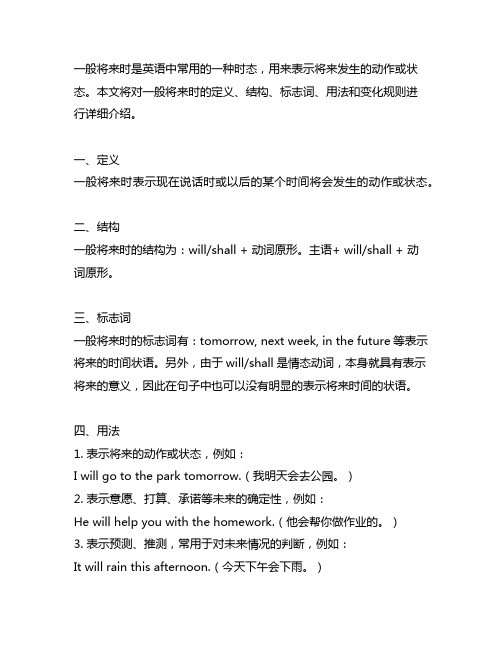
一般将来时是英语中常用的一种时态,用来表示将来发生的动作或状态。
本文将对一般将来时的定义、结构、标志词、用法和变化规则进行详细介绍。
一、定义一般将来时表示现在说话时或以后的某个时间将会发生的动作或状态。
二、结构一般将来时的结构为:will/shall + 动词原形。
主语+ will/shall + 动词原形。
三、标志词一般将来时的标志词有:tomorrow, next week, in the future等表示将来的时间状语。
另外,由于will/shall是情态动词,本身就具有表示将来的意义,因此在句子中也可以没有明显的表示将来时间的状语。
四、用法1. 表示将来的动作或状态,例如:I will go to the park tomorrow.(我明天会去公园。
)2. 表示意愿、打算、承诺等未来的确定性,例如:He will help you with the homework.(他会帮你做作业的。
)3. 表示预测、推测,常用于对未来情况的判断,例如:It will rain this afternoon.(今天下午会下雨。
)五、变化规则1. 肯定句的一般将来时结构为:will/shall + 动词原形。
例如:She wille to see me tomorrow.(她明天会来看我。
)2. 否定句的一般将来时结构为:will/shall + not + 动词原形。
例如:I will not go to the party tonight.(我今晚不会去参加派对。
)3. 疑问句的一般将来时结构为:will/shall + 主语+ 动词原形。
例如:Will youe to the meeting tomorrow?(你明天会来参加会议吗?)以上就是关于一般将来时的定义、结构、标志词、用法和变化规则的详细介绍。
希望对您有所帮助。
一般将来时是英语中最常用的一种时态之一,用于表示将来会发生的动作或状态。
一般将来时
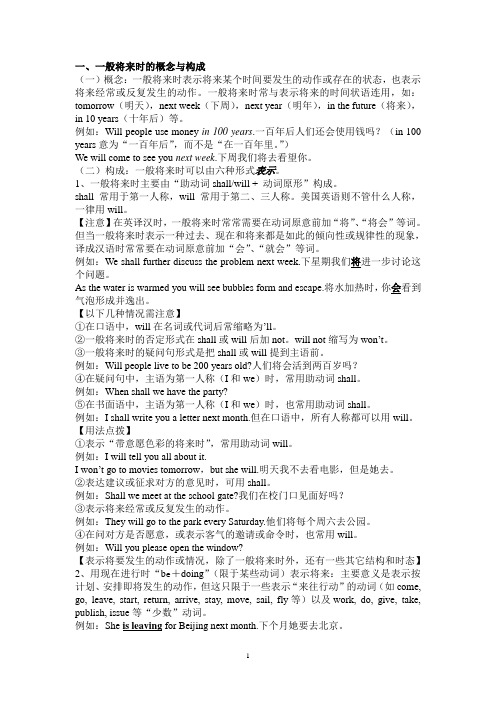
一、一般将来时的概念与构成(一)概念:一般将来时表示将来某个时间要发生的动作或存在的状态,也表示将来经常或反复发生的动作。
一般将来时常与表示将来的时间状语连用,如:tomorrow(明天),next week(下周),next year(明年),in the future(将来),in 10 years(十年后)等。
例如:Will people use money in 100 years.一百年后人们还会使用钱吗?(in 100 years意为“一百年后”,而不是“在一百年里。
”)We will come to see you next week.下周我们将去看望你。
(二)构成:一般将来时可以由六种形式表示。
1、一般将来时主要由“助动词shall/will + 动词原形”构成。
shall 常用于第一人称,will常用于第二、三人称。
美国英语则不管什么人称,一律用will。
【注意】在英译汉时,一般将来时常常需要在动词原意前加“将”、“将会”等词。
但当一般将来时表示一种过去、现在和将来都是如此的倾向性或规律性的现象,译成汉语时常常要在动词原意前加“会”、“就会”等词。
例如:We shall further discuss the problem next week.下星期我们将进一步讨论这个问题。
As the water is warmed you will see bubbles form and escape.将水加热时,你会看到气泡形成并逸出。
【以下几种情况需注意】①在口语中,will在名词或代词后常缩略为’ll。
②一般将来时的否定形式在shall或will后加not。
will not缩写为won’t。
③一般将来时的疑问句形式是把shall或will提到主语前。
例如:Will people live to be 200 years old?人们将会活到两百岁吗?④在疑问句中,主语为第一人称(I和we)时,常用助动词shall。
一般将来时
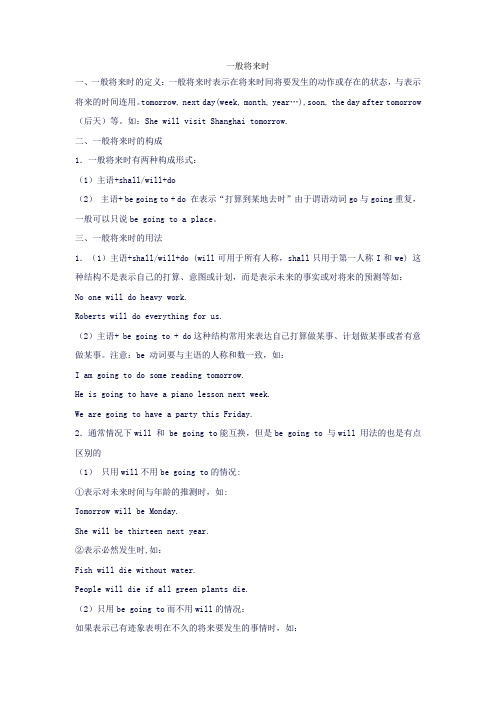
一般将来时一、一般将来时的定义:一般将来时表示在将来时间将要发生的动作或存在的状态,与表示将来的时间连用。
tomorrow, next day(week, month, year…),soon, the day after tomorrow (后天)等。
如:She will visit Shanghai tomorrow.二、一般将来时的构成1.一般将来时有两种构成形式:(1)主语+shall/will+do(2)主语+ be going to + do 在表示“打算到某地去时”由于谓语动词go与going重复,一般可以只说be going to a place。
三、一般将来时的用法1.(1)主语+shall/will+do (will可用于所有人称,shall只用于第一人称I和we) 这种结构不是表示自己的打算、意图或计划,而是表示未来的事实或对将来的预测等如:No one will do heavy work.Roberts will do everything for us.(2)主语+ be going to + do这种结构常用来表达自己打算做某事、计划做某事或者有意做某事。
注意:be 动词要与主语的人称和数一致,如:I am going to do some reading tomorrow.He is going to have a piano lesson next week.We are going to have a party this Friday.2.通常情况下will 和 be going to能互换,但是be going to 与will 用法的也是有点区别的(1)只用will不用be going to的情况:①表示对未来时间与年龄的推测时,如:Tomorrow will be Monday.She will be thirteen next year.②表示必然发生时,如:Fish will die without water.People will die if all green plants die.(2)只用be going to而不用will的情况:如果表示已有迹象表明在不久的将来要发生的事情时,如:Look at those black clouds, It’s going to rain.3.某些动词如:go/come/leave/start/begin/arrive等,它们的现在进行时可以表示将来时,如:They are leaving for Shanghaitomorrow.My brother is coming here soon.四、一般将来时的句式变换肯定句:主语+shall/will+do主语+ be going to + do否定句:主语+shall/will+not+do(will not 可缩写成won’t)主语+ be+ not+ going to +do一般疑问句:shall/will+主语+ dobe+主语+going to+do特殊疑问句:疑问词+ shall/will+主语+do疑问词+be+主语+going to+do〔1〕一般将来时肯定句:人+will+动词+名词+时间I will go to school tomorrow.He will play football on Monday.〔2〕一般将来时否定句:人+won't+动词+名词+时间I won’t go to school tomorrow.He won’t play football on Monday.〔3〕一般将来时是非疑问句提问:will+人+动词+名词+时间对它的回答:Yes,人+will / No,人+won'tWill you go to school tomorrow? Yes,I will / No,I won'tWill he play football on Monday? Yes,he will / No,he won't〔4〕一般将来时开放问题提问:what+will+人+动词+时间对它的回答:人+will+动词+名词+时间What will you do tomorrow?I will go to school tomorrow.。
一般将来时
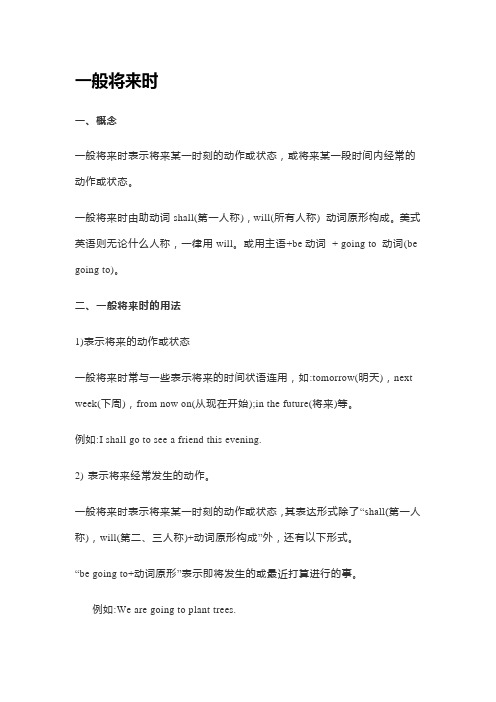
一般将来时一、概念一般将来时表示将来某一时刻的动作或状态,或将来某一段时间内经常的动作或状态。
一般将来时由助动词shall(第一人称),will(所有人称) 动词原形构成。
美式英语则无论什么人称,一律用will。
或用主语+be动词+ going to 动词(be going to)。
二、一般将来时的用法1)表示将来的动作或状态一般将来时常与一些表示将来的时间状语连用,如:tomorrow(明天),next week(下周),from now on(从现在开始);in the future(将来)等。
例如:I shall go to see a friend this evening.2)表示将来经常发生的动作。
一般将来时表示将来某一时刻的动作或状态,其表达形式除了“shall(第一人称),will(第二、三人称)+动词原形构成”外,还有以下形式。
“be going to+动词原形”表示即将发生的或最近打算进行的事。
例如:We are going to plant trees.三、一般将来时的句型①肯定句:主语+ be going to do /will/shall+ 动词原形②否定句:主语+ be not going to do /will not/shall not+ 动词原形③疑问句:Be动词+主语+ going to do /Will/Shall+主语+ 动词原形简略回答:(肯)Yes,主语shall/will (否) No,主语+shan't/won't④特殊疑问句:特殊疑问词+一般疑问句(就主语提问时,以疑问词who开头的疑问词除外)----- Why will you be here on Sunday?(周日你为什么将要在这儿?)-----I will have a meeting on Sunday(我将要在周日举行一个聚会)(对特殊疑问句要进行具体回答)一般疑问句:be或will提到句首,some改any,and改or,第一二人称互换We are going to go on an outing this weekend.-------Are you going to go on an outing this weekend?被动句:will/shall+be+v.ed(及物动词过去分词)The letter will be sent tomorrow.这封信明天将寄出去We shall be punished if we break the rule.如果我们违反规定,我们将受到惩罚。
一般将来时
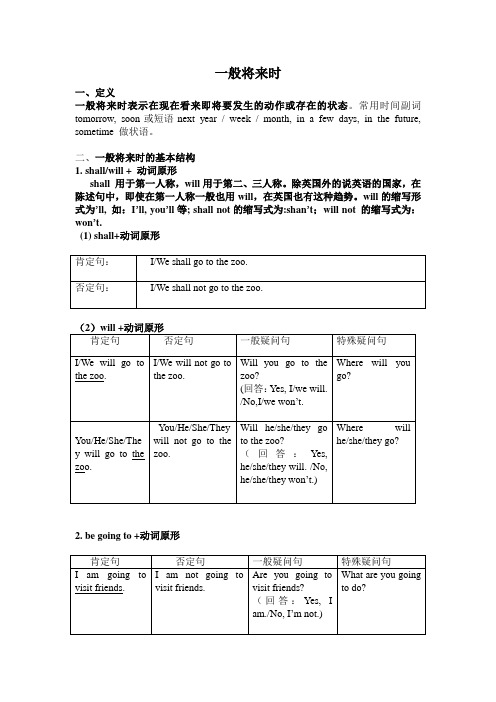
一般将来时一、定义一般将来时表示在现在看来即将要发生的动作或存在的状态。
常用时间副词tomorrow, soon或短语next year / week / month, in a few days, in the future, sometime 做状语。
二、一般将来时的基本结构1.shall/will + 动词原形shall 用于第一人称,will用于第二、三人称。
除英国外的说英语的国家,在陈述句中,即使在第一人称一般也用will,在英国也有这种趋势。
will的缩写形式为’ll, 如:I’ll, you’ll等; shall not的缩写式为:shan’t;will not 的缩写式为:won’t.(1) shall+动词原形肯定句:I/We shall go to the zoo.否定句:I/We shall not go to the zoo.(2)will +动词原形肯定句否定句一般疑问句特殊疑问句I/We will go to the zoo. I/We will not go tothe zoo.Will you go to thezoo?(回答:Yes, I/we will./No,I/we won’t.Where will yougo?You/He/She/The y will go to the zoo.You/He/She/Theywill not go to thezoo.Will he/she/they goto the zoo?(回答:Yes,he/she/they will. /No,he/she/they won’t.)Where willhe/she/they go?2. be going to +动词原形肯定句否定句一般疑问句特殊疑问句I am going to visit friends. I am not going tovisit friends.Are you going tovisit friends?(回答:Yes, Iam./No, I’m not.)What are you goingto do?He/She is going to visit friends. He/She is not goingto visit friends.Is he/she going tovisit friends?(回答:Yes, he/sheis./No,he/she isn’t.)What is he/shegoing to do?We/You/They are going to visit friends. We/You/They are notgoing to visit friends.Are you/they goingto visit friends?(回答:Yes, we/theyare./No,we/theydon’t.)What are you/theygoing to do?三、一般将来时的基本用法1.表示单纯的将来事实,由“will / shall + 动词原形”构成。
- 1、下载文档前请自行甄别文档内容的完整性,平台不提供额外的编辑、内容补充、找答案等附加服务。
- 2、"仅部分预览"的文档,不可在线预览部分如存在完整性等问题,可反馈申请退款(可完整预览的文档不适用该条件!)。
- 3、如文档侵犯您的权益,请联系客服反馈,我们会尽快为您处理(人工客服工作时间:9:00-18:30)。
will
is
will be
be
✍tomorrow morning是将来时间状语,需要使用一般将来时,情态动词后跟动词原形,因此选择C项。
are; meet
will; meeting
do; meet
shall; meet
✍由tomorrow morning可知应用一般将来时,又主语是we,一般用shall。
因此选择D 项。
Will; are
Will; be
Do; be
Are; be
✍next Sunday是将来时间状语,使用一般将来时,will+动词原形,因此选择B项。
isn’t working
doesn’t working
isn’t going to working
won’t work
✍next month下个月,是表示将来的时间状语,谓语使用一般将来时。
work是延续性动词,不能用进行时表示将来,因此选择D。
will gives
will give
gives
give
✍next birthday是将来时间状语,一般将来时构成是will+动词原形,因此选择B项。
一般将来时- A2
will; goes
do; go
will; going
shall; go
✍tomorrow afternoon是将来时间状语,主语是we一般用shall,因此选择D项。
Are; going to borrow
Is; going to borrow
Will; borrows
Are; going to borrows
✍borrow的一般将来时构成形式will/be going to + borrow,主语是第三人称单数,因此A、D项错误,C项需要使用动词原形,因此选择B。
willn’t
don’t
won’t
didn’t
✍在if引导的条件状语从句中,主句谓语用一般将来时,从句谓语用一般现在时表示将来,will和not缩写为won’t,因此选择C。
are having
are going to have
will having
is going to have
✍next Sunday是将来时间,谓语使用一般将来时。
have不能用进行时表示将来,排除A 项。
C项正确应该是will+动词原形,D项主谓不一致,因此选择B。
they willn’t
they won’t
they aren’t
they don’t
✍问句will + 动词原形构成将来时,否定回答缩写正确形式是won’t。
因此选择B项。
are going
will have
is going to have
will be
✍there be表“存在”,它的将来时态有两种there is going to be 和there will be,由next week可知体育大会还未召开,故用将来时。
选择D项。
Are; going to; will
Are; going to be; will
Are; going to; will be
Are; going to be; will be
✍tomorrow是表示将来的时间状语,谓语使用一般将来时。
一般将来时构成will + 动词原形,表示客观上将来势必发生的事情,而be going to do也可以构成将来时,表示根据主观判断将来肯定发生的事情。
be free是“有空,空闲”的意思,因此选择D项。
will fly; will go
will fly; goes
is going to fly; will goes
flies; will go
✍tomorrow是将来时间状语,fly a kite是“放风筝”的意思,go boating固定搭配,意
思是“去划船”,B、D项时态不正确,而C项will后应该接动词原形,因此选择A。
was
is going to have
will have
is going to be
✍there be表示存在,将来时构成是there is going to be或者there will be,因此选择D。
was; shall
am; will go
haven’t; went
wasn’t; went
✍句意:我累了,我今晚要早点休息。
前一句是现在时,后一句中tonight“今晚”表示将来,谓语需使用一般将来时,因此正确答案为B项。
writes
has written
will write
wrote
✍as soon as连接的时间状语从句,主句使用一般将来时,从句使用现在时表示将来时。
句意:他一到达那里,就会给我们写信。
所以选择C项。
has; gone
will; go
did; go
does; go
✍is leaving是现在进行表示将来,所以下句也需要使用一般将来时,因此选择B项。
will go
won’t go
don’t go
doesn’t go
✍if条件句中,主句使用一般将来时,从句使用一般现在时表示将来,排除C、D。
go roller-skating滑旱冰。
句意:如果不下雨,明天就可以去滑旱冰。
因此排除B,正确答案为A。
will go; won’t rain
won’t go; isn’t rain
won’t go; not rain
will go; doesn’t rain
✍if条件状语从句中表示用一般现在时表示将来时。
而主句中使用一般将来时,因此选择D 项。
will
shall
would
shan’t
✍一般将来时构成为will/shall+ 动词原形,而shall只用于第一人称,因此排除B、D。
would + 动词原形为过去将来时,此句不合适。
因此答案为A。
will be; is
is; is
will be; will be
is; will be
✍this week这周,谓语使用一般现在时。
next week下周,是表示将来的时间状语,需要使用一般将来时,因此选择D项。
are leaving
leave
left
have left
✍由tomorrow可知要用一般将来时,点动词leave的进行时可以表将来,因此选择A。
will watching
watches
is watching
are going to watch
✍the day after tomorrow是将来时间状语,需要使用一般将来时,A项will后应该接动词原形,B、C项时态不对,因此选择D项。
will say; will wake
say; wake
will say; wakes
say; woke
✍as soon as一……就……,时间状语从句中用一般现在时表示将来,主句使用一般将来时。
句意:他一醒来我就对他说“爸爸我爱你”。
因此选择C项。
arrive
will arrive
arrives
would arrive
✍此句意思是:你知道他什么时候到达吗?可知事情未发生,所以用一般将来时。
宾语从句中使用陈述句语序,因此选择B项。
gives
gave
will giving
is going to give
✍next birthday是将来时间,谓语需要使用将来时间状语。
be going to 含有“计划,准备”的意思。
句意:他打算在她下个生日时给她一顶漂亮的帽子。
因此选择D。
coming back
came back
will come back
is going to coming back
✍in three days是将来时间状语,需要使用一般将来时,因此选择C。
are; doing; leave
are; doing; left
will; do; leave
will; do; left
✍句意:当你到这儿以后,你将会做什么?时间状语从句中用一般现在时表将来,主句使用一般将来时。
因此选择C。
gives
gave
give
will give
✍next Monday是将来的时间,需要使用一般将来时,因此选择D项。
going to arrive
will be arrive
is going to
is arriving
✍arrive,get,come,leave等点动词可以用进行时表示将来时。
句意:火车将会在11点到。
因此选择D。
